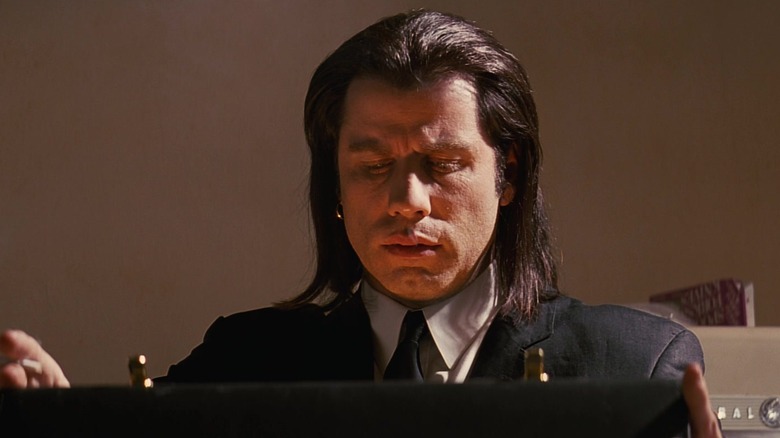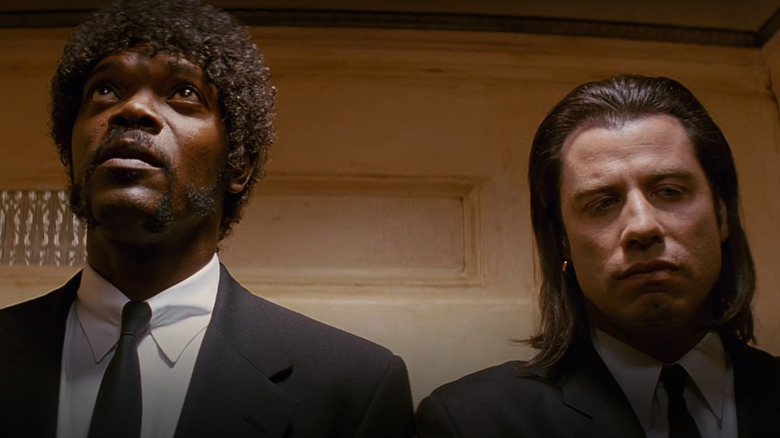Pulp Fiction: What Was In The Briefcase (If Not Marsellus Wallace's Soul)?
In Quentin Tarantino's 1994 hit "Pulp Fiction," Jules Winnfield (Samuel L. Jackson) and Vincent Vega (John Travolta) carry a briefcase belonging to their boss Marsellus Wallace (Ving Rhames) for most of the film, recovering and guarding it carefully from small-time criminals and putting their own lives on the line to do so. Throughout the movie, we get a few tantalizing glimpses of the case's glowing contents, but never fully discover what it holds. A popular fan theory is that Marsellus had sold his soul to the devil and it was in the case, which would explain its combination of 666 and the band-aid on the back of Marsellus' neck. That spot is rumored to be the extraction point for a human soul, although actor Phil LaMarr, who played Marvin in the film, dismissed the idea on an episode of the podcast "I Was There Too."
In reality, the band-aid was simply a result of Rhames' shaky hands. As LaMarr explained to host Matt Gourley, "Ving shaves his own head, and he showed up at rehearsal with a Band-Aid on the back of his head. Just think...if Rhames had gone to a professional barber the day before rehearsal, we might have avoided this whole debate."
As for the prop briefcase, it contained some batteries and a yellow light bulb, and when LaMarr asked Tarantino what the bulb represented, the writer and director responded simply, "It's whatever you want it to be."
The briefcase may have contained an Oscar statuette
If Quentin Tarantino wanted audiences to let their imaginations run wild with the possibilities, why not indulge in that? If the briefcase did not contain Marsellus Wallace's soul, one possibility is that it housed a coveted Oscar trophy. Tarantino earned his first Academy Award for the "Pulp Fiction" screenplay to go along with a best director nomination — one of seven nods that the film earned.
It could be that the case was designed to hold the coveted award he hoped he would take home that year; that would explain the golden glow seen on the faces of the characters who were lucky enough to gaze upon its contents. Wallace's wife Mia (Uma Thurman) is an aspiring actor, having starred in a television pilot that was never picked up. Perhaps Marsellus had stolen an Oscar trophy for her, knowing her acting career had been derailed, at least for the time being. Although Tarantino's Oscar trophy case was barren when "Pulp Fiction" was released, he would go on to win another best original screenplay award in 2013 for "Django Unchained."
There are other nods to Hollywood within Pulp Fiction
If the briefcase contained neither Marsellus Wallace's soul nor an aspirational Oscar trophy for Quentin Tarantino, could it have been an homage to one of his earlier films? An article on Entertainment.ie speculates that the case could have held the cache of diamonds from "Reservoir Dogs." Roger Avary, who helped Tarantino come up with the story for "Pulp Fiction," said that was the original intent, but the two later decided to leave room for audiences to use their imaginations. In an interview for Roger Ebert's Questions for the Answer Man, Avary told Ebert, "Originally the briefcase contained diamonds. But that just seemed too boring and predictable. So it was decided that the contents of the briefcase were never to be seen. No prop master can come up with something better than each individual's imagination."
The article also suggests that the briefcase may have housed the gold suit worn by the ghost of Elvis Presley (Val Kilmer) in "True Romance." That theory is lightly supported by a line early in "Pulp Fiction," when Jules says the case contains his boss' dirty laundry.
Elvis symbolism is present elsewhere in the film, with one of his movie posters hanging at Jack Rabbit Slim's, and Vincent adopting an Elvis-eque voice while in conversation with Mia. There is another brief wink at Hollywood and filmmaking early on in "Pulp Fiction" as well. When Jules and Vincent are moments from recovering the case, the former tells his partner to "get into character."


